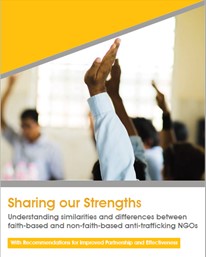This study contributes knowledge about anti-trafficking faith-based and non-faith-based NGOs—how they compare in their goals and mission, why they do what they do, the care philosophies and services that they have, and how they can work together. This report is based on research conducted in Cambodia on anti-trafficking Christian faith-based organisations (FBOs) and non-faith-based NGOs, as well as collaboration after the study to present the findings (with recommendations) in an accessible and helpful way to a global audience of anti-trafficking professionals.
Several leaders in the anti-trafficking field collaborated with this report’s author, John Frame, to help shape his PhD research findings into something that could be valued and used among the wider anti-trafficking community. The names of these individuals are listed in the Acknowledgments section above. The group reviewed the results of the study, met collectively online to discuss how these findings could be streamlined and ‘packaged,’ and then continued to support the project through reviews and 1-1 consultations with the author. While the main question that guided the original study in 2013 explored to what extent religious faith might distinguish Christian FBOs from non-faith-based NGOs, this report focuses on how faith-based and non-faith-based organisations can work together. Focusing on building partnerships, this report takes the research findings and shapes them in a way that can be practically helpful to FBOs and non-faith-based anti-trafficking NGOs interested in increasing partnership. Nine recommendations are discussed throughout the report and listed at the end. The recommendations in this report are focused on how greater forms of understanding and partnership can be established between FBOs and non-faith-based organisations.
All in all, this report seeks to enhance understanding about anti-trafficking faith-based and non-faithbased NGOs and encourage enhanced partnerships between them. This report is intended to be a tool for discussion among organisations about best practices and meaningful collaboration. Questions at the end of each section can be reflected on individually or used to spark discussion in workshops or staff meetings.
This report points to the value of organisations being aware of, and committed to, their goals, motivations, and philosophies of care. It is hoped that the findings from this study may prompt more dialogue among FBOs, non-faith-based NGOs, and policy stakeholders about the extent to which similarities and differences may exist between organisations, and why.

